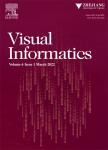A theoretical model for pattern discovery in visual analytics
作者机构:Fraunhofer Institute IAISSankt-AugustinGermany CityUniversity of LondonLondonUK TU WienViennaAustria University of RostockRostockGermany University of BonnBonnGermany
出 版 物:《Visual Informatics》 (可视信息学(英文))
年 卷 期:2021年第5卷第1期
页 面:23-42页
核心收录:
学科分类:08[工学] 0812[工学-计算机科学与技术(可授工学、理学学位)]
基 金:This research was supported by Fraunhofer Center for Machine Learning within the Fraunhofer Cluster for Cognitive Internet Technologies by DFG within Priority Programme 1894(SPP VGI) by EU in project SoBigData++ by SESAR in projects TAPAS and SIMBAD by Austrian Science Fund(FWF)project KnowVA(grant P31419-N31)
主 题:Visual analytics Data distribution Pattern Abstraction Data organisation Data arrangement Data variation Pattern discovery
摘 要:The word‘pattern’frequently appears in the visualisation and visual analytics literature,but what do we mean when we talk about patterns?We propose a practicable definition of the concept of a pattern in a data distribution as a combination of multiple interrelated elements of two or more data components that can be represented and treated as a unified *** theoretical model describes how patterns are made by relationships existing between data *** the types of these relationships,it is possible to predict what kinds of patterns may *** demonstrate how our model underpins and refines the established fundamental principles of *** model also suggests a range of interactive analytical operations that can support visual analytics workflows where patterns,once discovered,are explicitly involved in further data analysis.



